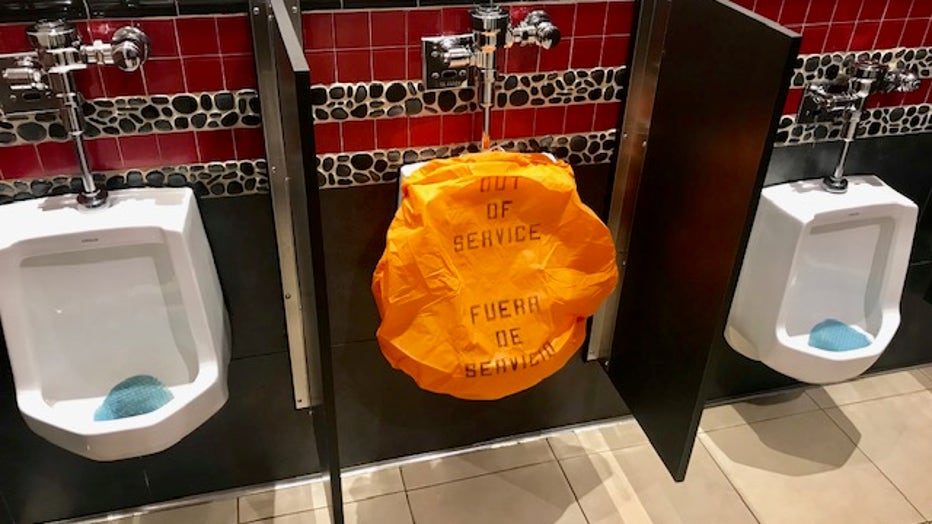How risky is using a public bathroom in a pandemic?
ATLANTA - The pandemic has made mundane tasks like grocery shopping and running errands more challenging, as people try to steer clear of the new coronavirus.
But, what can you do if you have to use the bathroom and you’re nowhere close to home?
Is it risky to use a public restroom?

Creating space for social distancing in public bathroom
Most of us are already careful about touching germy sinks and handles.
Now, scientists say, we may have one more thing to worry about in public restrooms: toilet plumes, caused by flushing the toilet.
Sign up for FOX 5 email alerts
"These plumes go up, with water vapor and even possible fecal matter," Steven Soifer, President of the American Restroom Association says. "The problem is, we now know that coronavirus can live for up to 30 days in fecal matter.
In a study of hospital bathrooms published in the journal Physics of Fluids, researchers found flushing the toilet can send a cloud of tiny aerosol droplets into the air nearly 3 feet around the toilet around the toilet
Scientists that after flushing, tiny particles were able to linger in the air as high as three feet above the toilet.
Those particles, researchers found, can linger in the air for up to a half-hour.
Soifer's organization advocates for safer, cleaner bathrooms, encouraging companies to put up dividers between urinals, install touch-free sinks and toilets, and use UV light systems to kill germs in restrooms.
"Between that and frequent cleansing and sanitizing bathrooms, a lot can be done to almost eliminated the possibility of getting coronavirus in public bathrooms," Soifer says. "We don't know if it happens. The data isn't there to tell us whether it's possible."
Until we know more, there are some simple ways to lower your risk in public restrooms:
Wear a mask
Make it quick
Wait a minute before entering a toilet stall, if someone is coming out, to allow the air to settle.
Before you flush the toilet, drop the toilet lid to prevent a plume.
And, always, wash your hands before heading out.
North Carolina A&T professor of nano-engineering Dr. Joseph L. Graves, Jr. says he isn't too worried about bathrooms spreading COVID-19.
"One good thing we've found out recently is that COVID-19 doesn't really do well on surfaces," Graves says. "It has a limited time on which it can survive on surfaces."
But people's hygiene habits, he says, are not the best.
"Unfortunately, I've been in public bathrooms, where I see people use the bathroom and walk straight out," Graves says.
Graves recommends trying to touch as few surfaces as possible.
"Your best friend is still soap and water. Make sure that you wash your hands, and keep your hands away from your nose and your eyes. Because this is a respiratory virus. You can't get sick from COVID by eating it. But you can get sick by inhaling it or getting it into your eye membranes."
Soifer acknowledges redesigning public restrooms can cost up to $25,000.
Still, he says there are some simple, less costly fixes, like installing hand sanitizer station inside each stall and stepping up bathroom cleanings to every 30 minutes.
"That is very cost effective," Soifer says. "It requires someone who is already employed or could be employed to make sure the bathrooms are pristinely clean."
Download the FOX 5 Atlanta app for breaking news and weather alerts.

